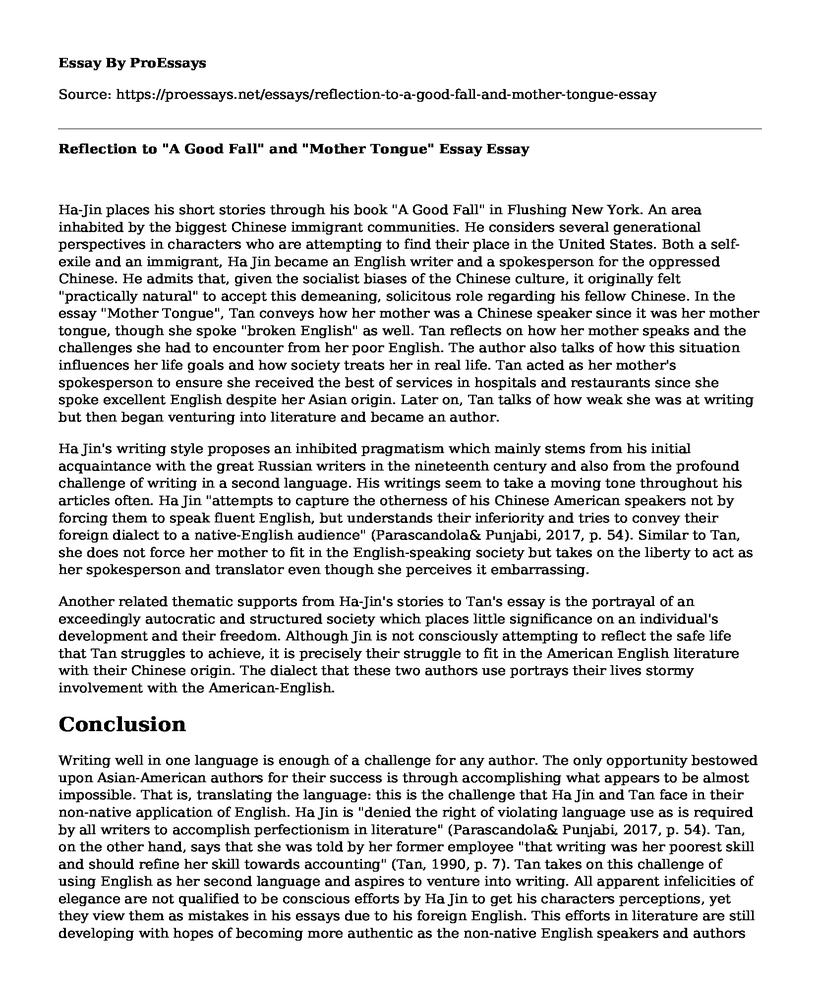Ha-Jin places his short stories through his book "A Good Fall" in Flushing New York. An area inhabited by the biggest Chinese immigrant communities. He considers several generational perspectives in characters who are attempting to find their place in the United States. Both a self-exile and an immigrant, Ha Jin became an English writer and a spokesperson for the oppressed Chinese. He admits that, given the socialist biases of the Chinese culture, it originally felt "practically natural" to accept this demeaning, solicitous role regarding his fellow Chinese. In the essay "Mother Tongue", Tan conveys how her mother was a Chinese speaker since it was her mother tongue, though she spoke "broken English" as well. Tan reflects on how her mother speaks and the challenges she had to encounter from her poor English. The author also talks of how this situation influences her life goals and how society treats her in real life. Tan acted as her mother's spokesperson to ensure she received the best of services in hospitals and restaurants since she spoke excellent English despite her Asian origin. Later on, Tan talks of how weak she was at writing but then began venturing into literature and became an author.
Ha Jin's writing style proposes an inhibited pragmatism which mainly stems from his initial acquaintance with the great Russian writers in the nineteenth century and also from the profound challenge of writing in a second language. His writings seem to take a moving tone throughout his articles often. Ha Jin "attempts to capture the otherness of his Chinese American speakers not by forcing them to speak fluent English, but understands their inferiority and tries to convey their foreign dialect to a native-English audience" (Parascandola& Punjabi, 2017, p. 54). Similar to Tan, she does not force her mother to fit in the English-speaking society but takes on the liberty to act as her spokesperson and translator even though she perceives it embarrassing.
Another related thematic supports from Ha-Jin's stories to Tan's essay is the portrayal of an exceedingly autocratic and structured society which places little significance on an individual's development and their freedom. Although Jin is not consciously attempting to reflect the safe life that Tan struggles to achieve, it is precisely their struggle to fit in the American English literature with their Chinese origin. The dialect that these two authors use portrays their lives stormy involvement with the American-English.
Conclusion
Writing well in one language is enough of a challenge for any author. The only opportunity bestowed upon Asian-American authors for their success is through accomplishing what appears to be almost impossible. That is, translating the language: this is the challenge that Ha Jin and Tan face in their non-native application of English. Ha Jin is "denied the right of violating language use as is required by all writers to accomplish perfectionism in literature" (Parascandola& Punjabi, 2017, p. 54). Tan, on the other hand, says that she was told by her former employee "that writing was her poorest skill and should refine her skill towards accounting" (Tan, 1990, p. 7). Tan takes on this challenge of using English as her second language and aspires to venture into writing. All apparent infelicities of elegance are not qualified to be conscious efforts by Ha Jin to get his characters perceptions, yet they view them as mistakes in his essays due to his foreign English. This efforts in literature are still developing with hopes of becoming more authentic as the non-native English speakers and authors such as Ha-Jin and Tan continue to experiment and exercise their skills in English use through writing.
References
Parascandola, L. J., & Punjabi, R. (2017). Language, Immigration and Acculturation in the Short Stories of Ha Jin. Asian American Literature: Discourses & Pedagogies, 8(1), Language-Otherness. Retrieved from https://scholarworks.sjsu.edu/cgi/viewcontent.cgi?referer=https://scholar.google.com/&httpsredir=1&article=1047&context=aaldp
Tan, A. (1990). Mother Tongue. The Threepenny Review, (43), 7-8. Retrieved from http://www.jstor.org/stable/4383908
Cite this page
Reflection to "A Good Fall" and "Mother Tongue" Essay. (2022, Aug 18). Retrieved from https://proessays.net/essays/reflection-to-a-good-fall-and-mother-tongue-essay
If you are the original author of this essay and no longer wish to have it published on the ProEssays website, please click below to request its removal:
- Book Review Example. On Writing: A Memoir of the Craft by Stephen King
- The History of Mary by Mary Prince Essay
- Sigurd Olson and John Muir Essay Example
- Themes and Situations in Groom Service and The Return Essay Example
- Exploring Walt Whitman's Poetry Styles - Essay Sample
- Essay Example on Stanzas on Freedom: Slavery as a Universal Issue
- Paper Example on True Love: Exploring Shakespeare's Iconic Sonnet 116







